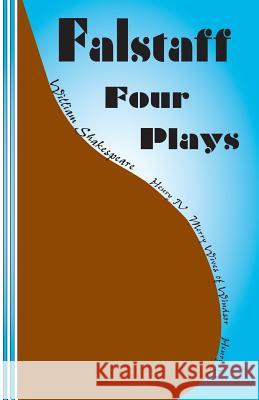Falstaff: Four Plays: Henry IV 1 and 2, The Merry Wives of Windsor, Henry V » książka
Falstaff: Four Plays: Henry IV 1 and 2, The Merry Wives of Windsor, Henry V
ISBN-13: 9780942208740 / Angielski / Miękka / 2012 / 400 str.
Falstaff: Four Plays: Henry IV 1 and 2, The Merry Wives of Windsor, Henry V
ISBN-13: 9780942208740 / Angielski / Miękka / 2012 / 400 str.
(netto: 57,14 VAT: 5%)
Najniższa cena z 30 dni: 60,00
ok. 16-18 dni roboczych
Bez gwarancji dostawy przed świętami
Darmowa dostawa!
A reader's edition, modernized language ("you" for "thee," etc.) and glossary for unfamiliar words. Plus chart of characters continuing from one play to another.
Falstaff appears, in one way or another, in four of Shakespeare's plays. His character serves as a counterpoint to the transformation of the scamp Prince Hal, who ultimately, on ascending the throne, must repudiate his old drinking and thieving buddy, Falstaff.
As seen in the chart of characters in the back matter, many characters appear in more than one play, including the reprobates surrounding Falstaff, a fat old knight whose moral sense has eroded to the mere semblance of propriety. The character of Falstaff has fascinated audiences for a few centuries now, for when he is on the stage, he's stage center. Even in his dying and death, his companions bring him back to memory.
Queen Elizabeth is reported to have been so enchanted with Falstaff after Shakespeare had written him into two plays, that she insisted he write another specifically for Falstaff, and that became "The Merry Wives of Windsor, " unrelated to history, just for fun, mostly at the expense of Falstaff.
"Henry V" shows the reformed Prince Hal as a conquering hero; meanwhile Falstaff can be heard from a back room, as he is dying.
If you've never seen the extravagant character of Falstaff onstage, try these free samples at http: //www.bandannabooks.com/free/falstaffsample.zip. Other works of Shakespeare, including Sir Toby Belch, a predecessor of the character of Falstaff, can be found at http: //www.bandannabooks.com/drama.php.
A dozen of these books are Playbooks for directors and producers actually involved in or planning to investigate live productions.











